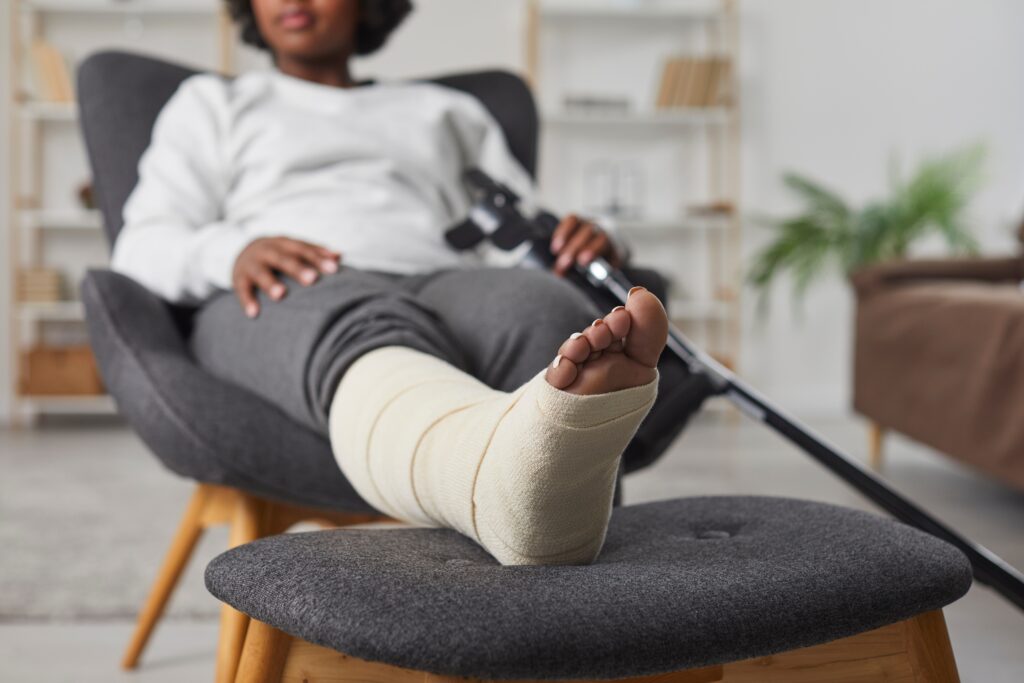Alberta Health covers your surgery, hospital stays, and doctor visits after a drunk driving accident. Most people think this means medical records don’t matter that much for their injury claim. This assumption could cost them thousands in compensation.
Your medical files become evidence for everything the government doesn’t pay, such as:
- Lost wages
- Pain and suffering
- Future care needs
- Diminished earning capacity
Insurance adjusters review medical documentation to evaluate claims and determine settlement amounts. They only pay for costs that are backed by proper documentation.
As personal injury lawyers in Alberta, we know how incomplete medical records affect settlement outcomes. We help clients maintain the documentation that protects their financial future. Call us today for a no-obligation consultation at (888) 664-5298.
GET YOUR FREE CONSULTATION NOW!
Why Are Medical Records the Cornerstone of Your DUI Injury Claim?
The Narrative of Your Injury
Medical records create a timeline from the moment of the accident onward, showing the progression of your condition and the treatments required. This narrative is a powerful tool. It allows an insurance company, or a court, to see a clear and detailed picture of your experience, from the initial trauma to the long-term consequences.
Objective Proof for Subjective Pain
Proving pain and suffering is challenging because it is a personal experience. How do you put a number on persistent headaches, sleepless nights, or the inability to enjoy hobbies you once loved? Detailed records from doctors, therapists, and other practitioners provide objective, third-party validation of your experience. They make your subjective pain tangible for insurance companies and the legal system.
Countering the “Minor Injury” Designation

Insurance companies may try to classify your injury as “minor” to limit your compensation under Alberta’s Minor Injury Regulation (MIR). Comprehensive medical evidence is the most powerful tool to demonstrate that your injury—whether it’s a traumatic brain injury, a spinal cord injury, or a serious soft tissue injury—has resulted in a “serious impairment” and falls outside the cap. Your records are the proof we use to fight for the full compensation you are entitled to.
The Document Checklist: What to Keep and Why
Here is a breakdown of what medical records you should keep after a DUI injury, organized by what they help prove.
To Prove the Nature and Severity of Your Injuries:
- Initial Hospital and Emergency Room Records: These documents are the starting point of your medical story. They establish the immediate aftermath of the accident and the initial diagnosis. They catalogue the first medical steps taken to stabilize and assess your condition.
- Diagnostic Imaging Reports: Keep copies of all X-ray, CT scan, and MRI reports. These are crucial for showing objective proof of physical harm. For injuries like fractures or severe brain and spinal cord trauma, these images are indispensable evidence.
- Doctors’ Notes and Specialist Reports: Every consultation matters. These notes document your ongoing symptoms, the evolution of your treatment plans, and your doctor’s professional opinion on your prognosis. They create a continuous, dated record of your recovery journey.
- Referrals: Keep records of all referrals to specialists, such as neurologists, orthopedic surgeons, or psychologists. This paper trail demonstrates that your family doctor recognized the complexity of your injuries required specialized attention, adding weight to the seriousness of your condition.
To Prove Pain and Suffering:
- A Personal Pain Journal: This is your own detailed account, and it can be incredibly persuasive. Note your daily pain levels on a scale of 1 to 10. Record your emotional state, any sleep disruptions, and any activities you can no longer do or that are now difficult. Be specific and be consistent. Instead of just writing “my back hurt,” try “I had sharp pain in my lower back (7/10) that made it impossible to sit for more than 15 minutes.”
- Prescription Records: A complete list of all medications you have been prescribed—including painkillers, anti-inflammatories, and psychological medications—helps demonstrate the severity of both your physical and mental distress.
- Therapy Records: This includes notes and progress reports from physiotherapists, chiropractors, massage therapists, and psychologists. These records show your commitment to recovery and simultaneously document the persistent challenges and pain you face.
- Statements from Family and Friends: While not “medical” records, testimonials from people who know you well can provide a powerful before-and-after picture. They speak to the changes in your personality, your activity levels, and your overall quality of life that they have witnessed firsthand.
To Prove Lost Income and Financial Losses:
- Employment Records: Gather pay stubs from before the accident or a formal letter from your employer. This documentation should confirm your wage, your typical hours, and your job duties. This establishes the baseline for what you have lost financially.
- Doctor’s Notes for Time Off Work: Any official note from a doctor recommending that you stay off work or work reduced hours is critical evidence. It directly links your injury to your inability to earn an income.
- Disability Forms: Keep copies of all forms submitted for Section B benefits or any private disability insurance you may have. These forms contain valuable information from both you and your doctor about the extent of your disability.
- Receipts for Out-of-Pocket Expenses: This includes anything not covered by Section B or other benefits. Catalogue costs for prescriptions, assistive devices (like a cane or brace), and even mileage for travel to and from your medical appointments. These small amounts add up.
Understanding the Alberta Context: Section B Benefits and the Minor Injury Regulation
In Alberta, the legal landscape for motor vehicle accidents has specific features that make record-keeping even more important. Two key elements are Section B “no-fault” benefits and the Minor Injury Regulation.
What Are Section B “No-Fault” Benefits?
Every Standard Automobile Policy (SPF No. 1) in Alberta includes Section B benefits. These are often called “no-fault” benefits, which simply means you can access them through your own insurance company regardless of who caused the accident. This system is designed to provide quick access to initial coverage for medical treatments and disability payments, so you can get the help you need without waiting for a legal claim to be resolved.
How Medical Records Impact Your Section B Disability Claim
To receive disability payments under Section B, you must provide proof to your insurer that you are “wholly and continuously” disabled from performing the duties of your job. Your medical records are the primary evidence for this. There is a seven-day period immediately following the disability for which you are not paid. This is not simply a waiting period; the income for that first week is lost but may be recoverable in your final injury claim against the at-fault driver.
The benefits themselves are calculated at 80% of your gross weekly income, up to a maximum of $600 per week. Your employment records are needed to calculate this amount, and your medical records are needed to prove you are eligible to receive it.
How Medical Records Help You Overcome the Minor Injury Regulation (MIR) Cap
The Insurance Act allows for a regulation that caps compensation for pain and suffering for injuries classified as “minor.” This typically includes sprains, strains, or certain whiplash-associated disorders (WAD). An insurance company will almost always try to fit your claim into this category to limit their payout.
However, an injury is not minor if it results in a “serious impairment.” In simple terms, this means the injury causes a substantial inability to perform your essential work tasks, your education, or your normal activities of daily living, and is not expected to improve substantially.
Your collection of medical records—from specialist reports and diagnostic imaging to your personal journal detailing your daily struggles—is the evidence we use to build the argument that your injury is not minor and that the cap should not apply to your claim. A lawyer can help you present this evidence effectively.
How to Organize Your Medical Records Effectively

Keeping your documents in order will not only strengthen your case but also reduce your stress. You do not need a complex system. A simple, consistent approach is best.
- Create a Central File: Use a physical binder with dividers or a secure digital folder on your computer. Organize your documents chronologically and by category (e.g., Medical Reports, Receipts, Employment Documents, Insurance Communication).
- Keep Originals and Duplicates: Store all original documents in a safe place, like a fireproof box or a safety deposit box. Use digital copies or photocopies for your working file that you can easily access and share with your lawyer.
- Track Your Communication: Keep a log of every phone call and email with doctors, therapists, and insurance adjusters. Note the date, time, the person you spoke with, and a brief summary of the conversation. This record can be invaluable for clarifying past discussions and holding people to their word.
Let Your Lawyer Handle the Official Requests: While you should keep every record you receive directly, do not worry about formally requesting all your files from hospitals or clinics. That is part of your lawyer’s job. Your legal team will handle the official process of gathering all necessary medical evidence on your behalf, ensuring nothing is missed.
FAQ for What Medical Records Should I Keep After a DUI Injury?
Yes, if you can. The police report contains important details about the accident, including the officer’s initial observations, witness information, and whether the other driver was charged with a criminal offence. However, if you are unable to get a copy yourself, do not worry. Our firm will obtain it for you as part of our case preparation.
No, you should never hide information about your medical history. Transparency is paramount. The focus of your claim will be on how the DUI accident aggravated or worsened your pre-existing condition. Attempting to withhold information can seriously damage your credibility and harm your claim. A skilled lawyer knows how to present this information properly to show the true impact of the new injury.
You should continue to document your symptoms and their impact on your life until your claim is fully resolved. Recovery is rarely a straight line; there will be good days and bad days. A consistent, long-term journal provides a highly persuasive and detailed account of your ongoing struggles, which is particularly important for countering claims that your injuries are “minor.”
Your privacy is protected by law. Generally, only the medical records that are relevant to the injuries you sustained in the accident are disclosed to the other side. We will work diligently to ensure that your unrelated and personal health information is kept confidential throughout the legal process.
It is common for recovery to have its ups and downs. However, significant and unexplained gaps in your treatment could be used by an insurance company to argue that your injuries were not serious or have resolved. Follow your doctor’s advice and attend all recommended appointments. If you must miss an appointment, be sure to document the reason why in your journal.
Secure Your Future with MNH Injury Lawyers
The documents you keep after a DUI injury provide the objective proof needed to secure fair compensation for your pain, your lost income, and the disruption to your life. You do not have to organize this evidence or face the insurance companies alone.
If a drunk driver has injured you, let us help you put the pieces together. The team at MNH Injury Lawyers has years of experience handling serious injury claims in Alberta. We will manage the evidence, build your case, and advocate on your behalf, so you can dedicate your energy to what matters most: your recovery.
Call us today at (888) 664-5298 for a free, confidential discussion about your claim.
